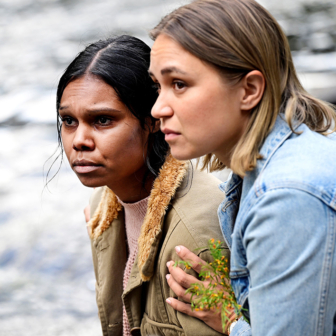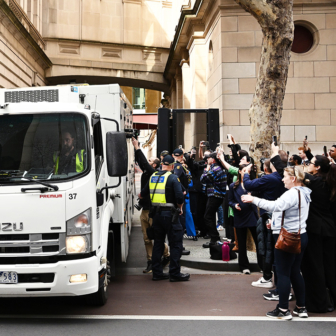The BBC charter is up for renewal, and members of senior and middle management have been co-opted into a working group “to identify what the BBC does best and find more ways of doing less of it better.” Actually, that’s fake news — or news fiction. It’s a summary of the first episode in the latest series of BBC Two’s satirical documentary W1A. BBC insiders have attested to the accuracy with which the series (whose title is the postcode of Broadcasting House in London) depicts a corporate culture in which ever more resources are indeed being devoted to finding ways of doing less.
At the ABC, which in so many respects mirrors the BBC, a similar range of scrambled corporate imperatives is being rolled out. In programming areas where our own national broadcaster purports to do best, like current affairs and investigative journalism, the quest to find “more ways of doing less of it better” is the order of the day. Or so it would seem, going on managing director Michelle Guthrie’s speech to the Friends of the ABC last week.
Yes, Lateline is finishing, and 7.30 is moving from its prime-time slot to… some time later than 7.30. Production staff on both programs were cut back earlier this year but, as Guthrie stressed, these and other efficiencies have enabled the broadcaster to create eighty new “content positions” in regional broadcasting, a “content investment fund,” and the Great Ideas Grant. When she announced these funding initiatives in March, Guthrie said she anticipated fierce competition for them, wanted to capitalise on the very best ideas, and would “love a creative solution that gives us a strong lead-in to the all-important 7pm ABC news program.”
All this sounds very much like something out of W1A, where everything is driven by the mandatory enthusiasms triggered by keywords like “content,” “audiences,” and “diversity.” And, of course, “ideas”: not any old ideas, but ideas that are new, great, exciting, brilliant, creative.
W1A’s PR specialist, Siobhan Sharpe, brings in a dour German consultancy team to stimulate the production of Great Ideas through the introduction of compulsory Fun Breaks. Brilliantly, she and her team solve the problems of content, audiences and diversity in one fell swoop by proposing “BBC ME,” a YouTube platform that allows viewers to post their own videos. As she explains to stunned colleagues on the charter renewal committee, “It’s your voice, but also the voice of the BBC.”
Like the ABC’s Utopia, W1A shows how management groupthink can displace normal human intelligence. While the stripping back of news and current affairs at the ABC certainly raises political questions, the real enemy may be this strange anthropological phenomenon of institutionally mandated cognitive evacuation.
Guthrie’s speech to the Friends of the ABC was a perplexing and at times disarming blend of sense and nonsense. There was a sensible corrective to those whose focus was only on Lateline: “I say look at the ABC’s commitment to the core mission of investigative journalism, not on the brand label. Too often, our stakeholders, and I include some of our journalists in that category, get trapped in the mystique of programs, seeing their longevity as trench lines in a ‘war’ against management.” Guthrie also spoke out against looming legislation designed to further a vendetta by politicians hostile to scrutiny.
Lateline, as she acknowledged, is a program with a proud heritage, but heritage preservation is not the business of ABC management. Guthrie’s “overarching ambition” was to make the ABC relevant to her children and grandchildren, and in doing so “to link the past, the present and the future.” This might work as a slogan, but if the goal is to forge a path to the future through intelligent links with the past, rather than arbitrary breaks, it’s worth looking back at the program’s beginnings.
When Kerry O’Brien first welcomed viewers to Lateline twenty-seven years ago, he promised a program that would deal in-depth with a single topic each night. Behind the scenes was a small team of producers and reporters “dedicated to reflection on and discussion of big ideas.” The program was unique, O’Brien reflected last week, in responding to a hunger for serious treatment of major issues. Doesn’t all this sound rather like something that might be pitched for Guthrie’s new Great Ideas Grant?
Over time, though, the program lost its momentum and its sense of mission. Too many compromises were made. Like 7.30, it became an assemblage of topics and interviews responding somewhat haphazardly to the dominant stories in the twenty-four-hour news cycle. The courage to probe a single issue disappeared, though perhaps — as the news media skitter in all directions, mesmerised by their own forms of compulsive repetition — an extended focus is exactly what we need now.
Take, for example, Lateline’s interview with Nick Xenophon last Friday, which followed his announcement that he would leave the Senate and run for office in South Australia. His encounter with Matt Wordsworth ran for just over nine minutes, about a third of the program.
Xenophon began by stressing the gravity and urgency of the situation that prompted his decision. State politics, he said, “is fundamentally broken,” and the political scene in his home state of South Australia has become dysfunctional. While he sought to elaborate by mentioning a lack of accountability, the misuse of taxpayers’ money, falling population and rising unemployment, Wordsworth kept deflecting to the federal picture. Wasn’t Xenophon risking some hard-won Senate seats? He’d held the balance of power, so how did that demonstrate his capacity to make a difference? Towards the end of the interview, Wordsworth pushed hard on the headline question: was the move driven by an ambition to be premier?
Wordsworth is a skilled interviewer, and they weren’t bad questions, but ultimately they did nothing to break out of the recycled narratives of political power play. Here was an opportunity to focus on some of the larger issues of regional government and policy. What does it mean to say that a system of government is “fundamentally broken”?
What, indeed, does Xenophon stand for? He has called himself a centrist, but “centrism” is often embraced by those who have neither the intellectual energy nor the political courage to break out of the prevailing neoliberal ideology. Ralph Nader, whom Xenophon refers to in passing as “my hero,” would certainly have no truck with the compromises in which centrists in the current environment are happy to involve themselves.
Guthrie may have a point about ABC staff and their supporters getting “trapped in the mystique of programs,” but conversely, it is too easy to equate changes of program with some kind of advancement in vision and insight. By all means let us have new programs, and new people to produce and present them. If ABC management want to go out on a recruiting drive along the highways and byways of regional Australia, let us give them our blessing.
Provided, that is, they can convince us they really know what they are about. Who will be appointed to these eighty new “content positions”? Where and how will suitably skilled and experienced people be found? What will they be doing, and why will they be doing it?
Where current affairs broadcasting is concerned, experience is of the essence. In an interview earlier this week with Nick Clegg, the former deputy prime minister of Britain and leader of the Liberal Democrats, Emma Alberici was able to refer back to the critical moment when he and Conservative leader David Cameron announced their intention to form a coalition government. “I was the European correspondent in 2010 and was in that Rose Garden… Five years later, you went from fifty-seven seats in the parliament to just eight and this year you lost your seat. Do you regret having gone into that coalition with the Conservatives?”
For those who chase stories, political losers seem hardly worth talking to, but for those in pursuit of insights, much can be learned from players who have had to throw in their hand. Clegg made some honest and interesting observations about the role of minor parties, and offered some cogent views on the ongoing crisis of Brexit, but a nine-minute interview can barely scratch the surface of such topics.
We are in a cultural environment in which media owners and managers suffer from an almost manic determination to ride the wave of technological transformation. They are obsessed with changing media platforms, changing audiences and, of course, the drying up of income streams. W1A’s Siobhan Sharpe, with her vision of BBC ME and her strident pronouncements that television is over — “over, guys, get it?” — is their apotheosis. Proposals like Guthrie’s Great Ideas Grant create the kind of atmosphere in which Sharpe would thrive. They are no substitute for real planning and real programs made by people who really do know what they are doing. ●




